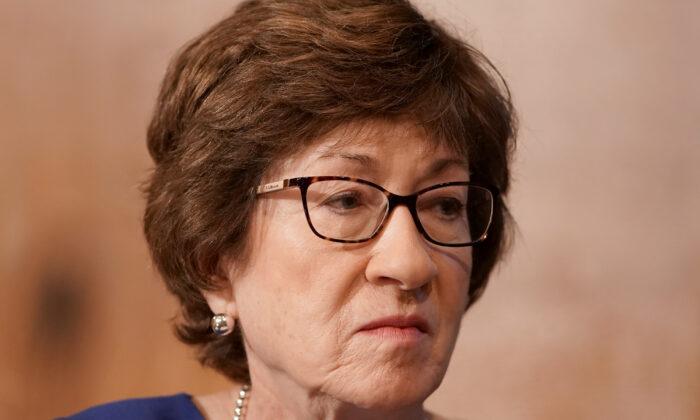President Donald Trump said Friday the effort to convince Sen. Susan Collins (R-Maine) to vote to confirm his Supreme Court nominee is not worth it.
Collins, 67, is the only Republican senator to go on record committing to not supporting Judge Amy Coney Barrett, Trump’s nominee for the nation’s highest court.
Trump took to Twitter to say he'd learned of “a nasty rumor” that Collins “will not be supporting our great United States Supreme Court Nominee.”
“Well, she didn’t support Healthcare or my opening up 5000 square miles of Ocean to Maine, so why should this be any different. Not worth the work!” he added.
A Collins spokeswoman didn’t return a request for comment.

Collins, considered one of the most moderate senators in office, has regularly voted against Trump.
Collins is facing a tight re-election race against Sara Gideon, speaker of the Maine House of Representatives. She and Trump, who is running for a second term, have declined to endorse each other.
Collins was essentially the deciding vote for Trump’s previous Supreme Court nominee. In 2018, she took to the Senate floor to announce she was voting for Judge Brett Kavanaugh after a process she described as “a dysfunctional circus.”
Kavanaugh was accused by multiple women of sexual assault but several of them later recanted and the others changed their stories or had witnesses dispute their accounts.
Kavanaugh was approved 50-48.
A simple majority vote in the Senate approves judicial nominees.
Republicans extended their control of the upper congressional chamber in the midterm elections by two seats.
The slightly more comfortable 53-47 majority means three Republicans can vote against Barrett or abstain and her confirmation will still go through.

No Democrats have said they will vote for the nominee and many have said they will not, including Sen. Joe Manchin (D-W.Va.), the only Democrat to vote for Kavanaugh.
Sen. Mitt Romney (R-Utah), a frequent Trump critic considered a possibility to defect in the upcoming vote, announced Thursday night that he would vote for Barrett’s nomination.
“She is impressive, and her distinguished legal and academic credentials make it clear that she is exceptionally well qualified to serve as our next Supreme Court justice. I am confident that she will faithfully apply the law and our Constitution, impartially and regardless of policy preferences,” he said in a statement.
The Senate Judiciary Committee vote on Barrett’s nomination is scheduled for Oct. 22. A full Senate vote is expected to take place before Nov. 3.






Friends Read Free